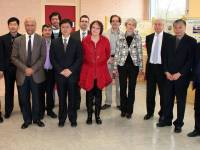Collaboration PKU-LSCE

The importance of anthropogenic climate change and the environment, both regionally and globally, is a challenge for the scientific community to further understand the complex interactions within the Earth system and its future evolution. The challenge is both to advance knowledge of the emerging mechanisms that control climate, and help define climate policy, taking into account co-benefits and trade-offs between biomass production, control of greenhouse gas emissions and management of water resources.
In particular, changes in land use associated with changes in food demand and climate change related to anthropogenic emissions of greenhouse gases and other compounds, impact the biogeochemical cycle of water, carbon, and the associated energy transfers.
The common scientific activities of the SOFIE research group between Peking University in China and the Laboratory of Sciences of Climate and Environment, Joint Research Unit of the CEA and UVSQ in France brings together more than 70 researchers and students focus on quantifying and understanding the interactions between biogeochemical cycles, the physics of the climate system and human-induced changes.
The primary objective of SOFIE in its first phase of development will be the study of feedbacks between the carbon cycle, atmospheric composition and climate, regional and global scales. The methods used are based on numerical and empirical models as well as the analysis of different Earth observation datasets. More than 80 rank A publications have been published jointly since 2009, including 10 in the prestigious journals: Nature, Science and PNAS.



